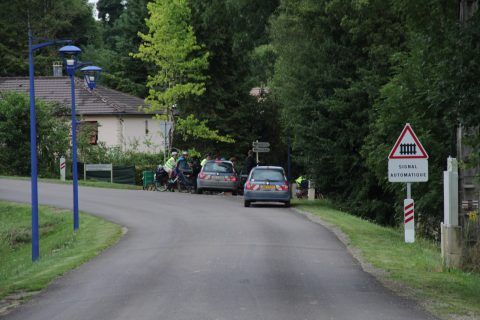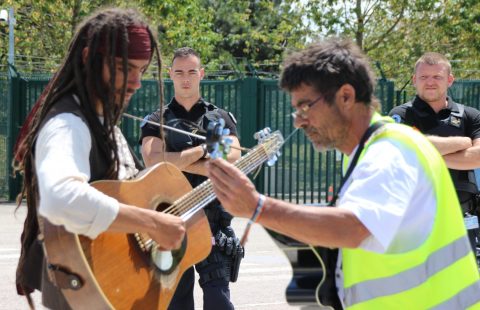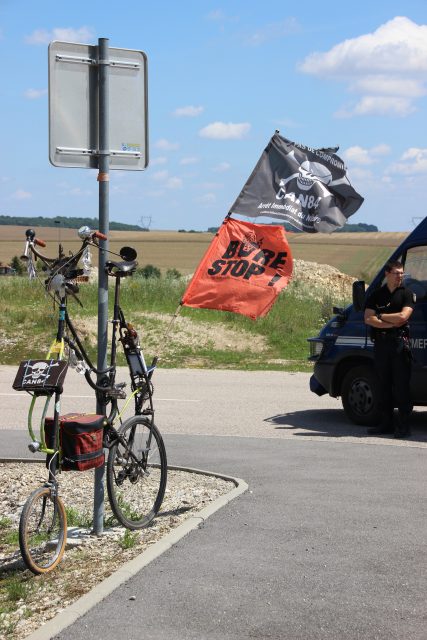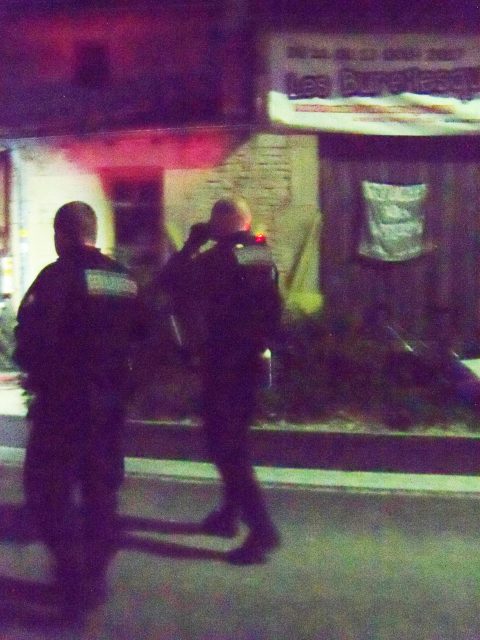After the so-called “terrorist attack” in France in November 2015, the French government decided to enter a “state of emergency”, which basically gives the police the right to search your house, check your ID, search you, arrest you, and forbid you to leave your flat as they like. Before the COP21 climate summit in December 2015, this was used to raid the flats of many activists, arrest them or forbid them to leave their houses to prevent them from taking action, and to forbid any demonstrations to happen at all.
The state of “emergency” has since been prolonged several times and will currently stay until November 2017, when it will be replaced under president Macron by another fascist law that basically has the same content but will be called “counter-terrorism” instead of “emergency” and will be permanent.
On the way to Bure, it was already not possible to go to a bakery or a supermarket without being followed by police on every step.
When we were still about 20 km away from Bure, we met on a field to discuss how we want to deal with the police on the way, and were immediately greeted by the military police “warning” us that the owner of the land might get angry about us being there. They continued to observe us and made sure to inform around 15 of their friends, one of them with a grenade gun, to greet and block us as soon as we started cycling to check some of our IDs.
On the way, a lot of police cars passed us, even on small gravel roads, in this area where the nearest supermarket is 15 km away and the only other vehicles that you meet are some tractors every now and again.
In Bure, the residents told us that they are sometimes IDed several times per day, sometimes right in front of the house.
On our 3rd day in Bure, we made a little excursion to the Andra research centre for nuclear waste, with two guitar players singing some songs about the destruction of the environment for us on the parking lot in front of the research centre. Joining a “demonstration” like this in the Police State means getting your ID card taken to the police car for half an hour. When they finished their three songs, they were fined for “blocking the road” (standing on the side of the parking lot and letting all cars pass) and for having a hand-written number plate on their van (probably the first time in the history of France that someone was fined for that). When we left, the police took themselves very seriously and warned us that if we would cycle next to each other on the way back instead of in a line, they would fine us as well. In a country where you can cycle at night without a light over a red traffic light in the wrong direction and no one will complain.
On the gravel track between the house of resistance and the forest, the police started making sure that no one is cycling there under the influence of alcohol.
On the last day, we made a small party outside of the house on the street. Whenever a car wanted to pass, which happened about once every two hours, we lifted the benches away to make space, which took about 30 seconds. But of course following law and order is very important, so soon about 10 cops with pepper spray bottles in their hands arrived, blocked the road with their car, and complained at us that we are blocking the road with our table.
One cop approached me when I was standing on the sidewalk and asked me “What are you doing?”. I told him “I’m standing here”, and he said “Okay” and left. Good thing there are some people who get paid and given guns to make sure that people who are standing on the sidewalk are really just standing on the sidewalk and not doing something forbidden at the same time.
They (illegally) forbade us to film them, and when we tried to take photos, they shone their torches in our direction. It seems like they are not very sure whether what they are doing is actually allowed.
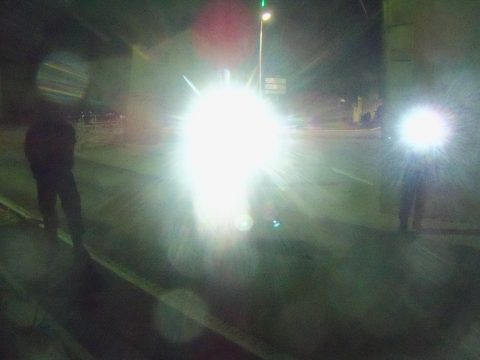 When they didn’t manage to get us to move the table, they called the mayor of the town to come and convince us. The mayor instead negotiated with them that we would only move the table after they would leave, and so our party could continue and the mayor stayed for some beers. It was the first time that the mayor hung out with the activists, a big victory for the struggle.
When they didn’t manage to get us to move the table, they called the mayor of the town to come and convince us. The mayor instead negotiated with them that we would only move the table after they would leave, and so our party could continue and the mayor stayed for some beers. It was the first time that the mayor hung out with the activists, a big victory for the struggle.






